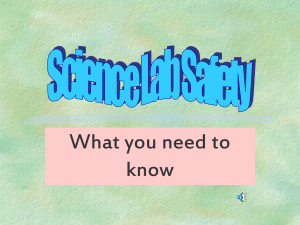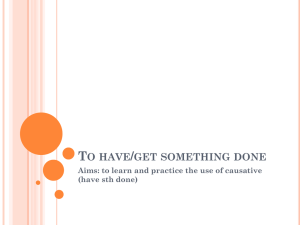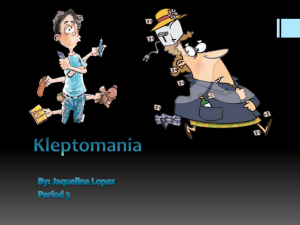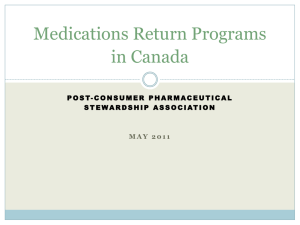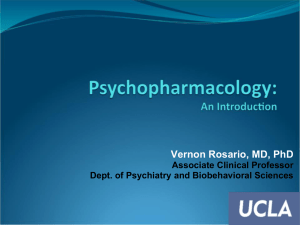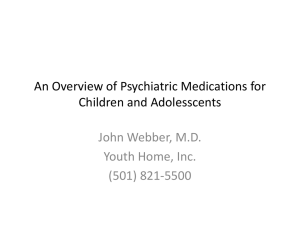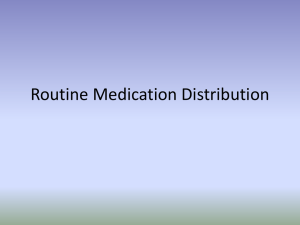Impulse Control
advertisement
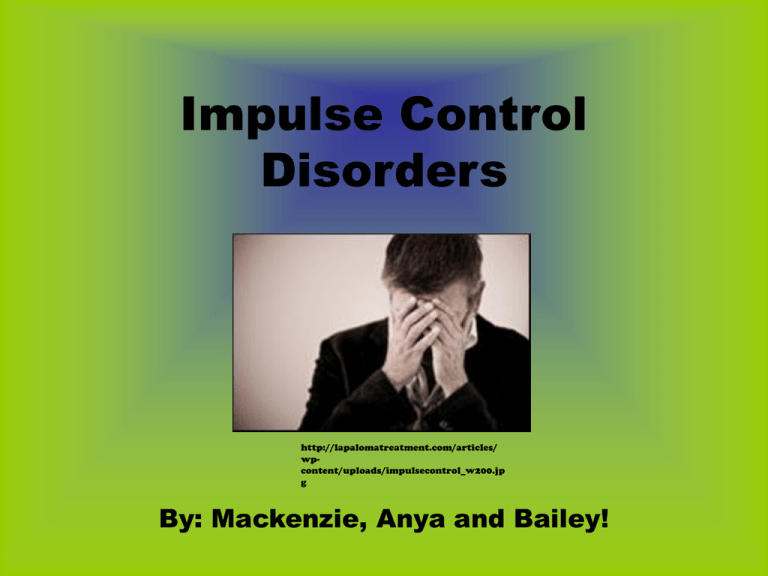
Impulse Control Disorders http://lapalomatreatment.com/articles/ wpcontent/uploads/impulsecontrol_w200.jp g By: Mackenzie, Anya and Bailey! Intermittent Explosive Disorder Definition: the inability to control violent impulses. It can be difficult to identify this disorder because it is often confused with bad temper or behaviour. Causes: Too much testosterone Childhood exposure to illegal substances Head trauma, seizures, brain infections Grown up with unstable family No role model in early life Low self-esteem, insecurity http://helpingpsychology.com/wpcontent/uploads/2010/07/iStock_0 00011086631XSmall.jpg Symptoms: • Can last 10-20 mins • Repeated, unpredictable episodes • No sign of aggression between episodes • Injuries and destruction of property • Irritable, increased anger, rage, tingling, chest tightness, headache http://1.bp.blogspot.com/_vbS 7BIUoZ94/SZeEnqP1OLI/AAA AAAAABI8/3lNsKcA38iU/s400 /abuse+03.jpg Treatments/Therapies: • Medication and/or individual/group therapy • Cognitive behaviour therapy • Medications: antidepressants, anticonvulsants, antianxiety agents, mood regulators Kleptomania Definition: the inability to resist the urge to steal things, although the items they steal have no personal gain. It is quite rare, and should not be confused with shop lifting. Causes: Possible genetic component Depression, mood disorders, obsessive compulsive disorder (OCD) are often present as well Most cases occur in females Large amounts of stress can trigger an episode http://www.buzzle.com/articles/kleptomaniatreatment.html Symptoms: • Urges to steal • Increased tension leading up to theft, pleasure while stealing, guilt and shame afterwards • Uncomfortably anxious, tense, or aroused • Spontaneous • Things like arguments can trigger an episode • Can show a fetish (stealing the same kind of thing) http://spotlight.femina.in/full-story/celebs-secret-illness-kleptomania Treatments/Therapies: medications including; antidepressants, mood stabilizers, benzodiazepines, anti-seizure medications, addiction Medication spsychotherapy: cognitive behaviour therapy, covert sensitization, aversion therapy, systematic desensitization http://hubpages.com/hub/Kleptomania-Be-Aware http://newsletter.nlb.gov.sg/back_apr_may06/reviews/bookreviews/health.asp Pathological Gambling Definition: an uncontrollable urge to gamble. It destroys relationships, causes financial problems, or can cause problems with the law, the individual can not stop. Causes: • Highly competitive http://www.irishhealth.com/article.ht ml?id=13296 • Problems with brain’s serotonin, norepinephrine and dopamine • Believe they have control over the situation, which relieves their stress • May have a genetic component • Majority of cases of pathological gambling occur in white males Symptoms: • Can be more serious during stress or depression • preoccupied with gambling and getting money • Usually about the excitement • taking time from work/family • feel remorse afterwards • borrow or steal money • Lying http://www.casinoteach.com/ Treatments/Therapies: • medications include: antidepressants, mood stabilizers, narcotic antagonists Psychotherapy: cognitive behaviour therapy, group therapy Pyromania Definition: uncontrollable impulse to set fires repeatedly with no motive. Causes: • Feels repressed by authority, but seeks attention • May have been neglected • Stressful events can trigger an episode • Can have bad social skills, and poor relationships, if any http://abtomorrow.blogspot.com/2010/06/pyromania.html Symptoms: • deliberate fire setting (more than once) • interest or attraction to fire http://shineanthology.wordpress.com/2009/12/24/should-sf-die/ • Tension or excitement prior to incident • pleasure/relief after or when setting fire Treatment/therapies: • treatment isn't found to work very well, and there aren't many approaches • medications: serotonin reuptake inhibitors • psychotherapy: behaviour modification Trichotillomania Definition: the uncontrollable desire to pluck hair from their body. This can be the hair on their head, but also can include the eyebrows, eyelashes, and other body hair. This can results in complete hair loss. Causes: • Mutations in a gene • Childhood abuse - including sexual, http://health.howstuffworks.com/skin-care/scalpcare/problems/trichotillomania1.htm physical, or emotional • May be a learned disorder • Stressful situations could trigger an episode Symptoms: • patchy/bald areas (head, eye lashes, eyebrows, etc) • chewing/eating/playing with pulled out hair • rubbing pulled out hair across lips or face • sometimes use tools (tweezers, etc) • Can be intentional or unintentional Treatments/therapies: • medications: antidepressents • psychotherapy: cognitive behaviour therapy, http://www.pgbeautygroomingscience.com/hair-loss.html acceptance and commitment therapy (ACT) http://ontrich.com/inspirationalphotos-of-trichotillomania.html Sources • http://allpsych.com/disorders/impulse_control/index.html • http://www.suite101.com/content/what-is-intermittentexplosive-disorder-a127176 • http://www.mentalhelp.net/poc/center_index.php?id=114 • http://www.mayoclinic.com/health/search/search • http://www.psychnet-uk.com/dsm_iv/pyromania.htm • http://www.brainphysics.com/kleptomania.php • http://psychcentral.com/lib/2007/what-causesintermittent-explosive-disorder/ • http://www.forensicpsychiatry.ca/impulse/overview.htm





